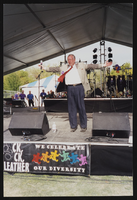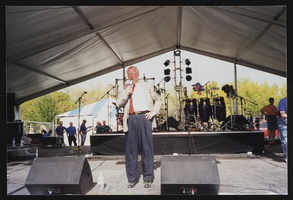Search the Special Collections and Archives Portal
Search Results
Tommy Nelson oral history interview
Identifier
Abstract
Oral history interview with Tommy Nelson conducted by Art Rader on November 29, 1974 for the Ralph Roske Oral History Project on Early Las Vegas. In this interview, Nelson discusses the history of Boulder City, Nevada and his career as a musician. He describes moving to Boulder City in 1932 and working as a laborer on the construction of Hoover Dam (Boulder Dam). Nelson describes life in the city during the construction of the dam, how the dam was built, and how Boulder City has changed. Nelson continues, talking about being a trumpeter, performing in various orchestras in Las Vegas, Nevada casino shows, and for injured United States service members during World War II.
Archival Collection
Jack Schofield oral history interview
Identifier
Abstract
Oral history interview with Jack Schofield conducted by Suzanne Becker on January 13, 2009 for Voices of the Historic John S. Park neighborhood. Schofield highlights his service as a fighter pilot in both World War II and the Korea conflict, his family genealogy, and his devotion to being an excellent educator, businessman, family man, and politician. Schofield describes his affection for the John S. Park Neighborhood and some of the changes that have occurred.
Archival Collection
Dinah Calhoon oral history interview
Identifier
Abstract
Oral history interview with Dinah Calhoon conducted by Margaret Neel on October 27, 1971 for the Ralph Roske Oral History Project on Early Las Vegas. Calhoon first discusses the various schools that she attended and the recreational activities and social clubs in which she belonged. Calhoon then discusses the different occupations she has had and the various parts of town in which she and her family lived. The interview later includes Calhoon’s thoughts on how she believes Southern Nevada should develop socially and recreationally, and it concludes with her recounting some of her earliest memories of Las Vegas, Nevada.
Archival Collection
Ora Bland oral history interview
Identifier
Abstract
Oral history interview with Ora Bland conducted by Claytee D. White on March 04, 2021 for African Americans in Las Vegas: a Collaborative Oral History Project.
Ora Bland speaks to what she knew of her husband's secretive work at Area 51 of the Nevada Test Site, businesses in the Westside community, and her work in the downtown Las Vegas post office. In addition to her life experiences, Ora shares her thoughts on her community, the state of homelessness that many experience in her surrounding neighborhood, and her activities during the COVID-19 pandemic.
Archival Collection

Las Vegas Mayor candidate Oscar Goodman on stage at Gay Pride, image 003: photographic print
Date
Archival Collection
Description
Image

Las Vegas Mayor candidate Oscar Goodman on stage at Gay Pride, image 004: photographic print
Date
Archival Collection
Description
Image
Perry D. Dickerson oral history interview
Identifier
Abstract
Oral history interview with Perry Dickerson conducted by Bryce Gracie on February 21, 1979 for the Ralph Roske Oral History Project on Early Las Vegas. Dickerson discusses the history of Las Vegas, Nevada from his perspective. In particular, he discusses telephone companies’ improvements, McCarren Airport growth, boat races at Lake Mead, Golden Nugget Hotel, Greyhound Depot bus station, the plane crash near Sloan Highway, Nellis Air Force Base, Lorenzi Park, Old Salt Lake Highway, Downtown Las Vegas, and Stardust Raceway.
Archival Collection
Shelia White oral history interview
Identifier
Abstract
Oral history interview with Shelia White conducted by Irene Rostine on May 24, 2012 for the Women's Research Institute of Nevada (WRIN) Las Vegas Women Oral History Project. White opens her interview by discussing her move to Boulder City, Nevada in 1953 with her mother. White then talks about her experiences working for the Southern Nevada Telephone company in the 1960s as a switchboard operator and how she eventually became a low-level customer service manager. She describes leaving the Southern Nevada Telephone company and being hired at the Desert Inn Hotel and Casino. White also discusses the writer Celesta Lowe, the Lowe family, and the MGM Grand fire in great detail.
Archival Collection
Sylvia Alvarado oral history interview
Identifier
Abstract
Oral history interview with Sylvia Alvarado conducted by Rodrigo Vazquez and Monserrath Hernández on April 12, 2019 for the Latinx Voices of Southern Nevada Oral History Project. In this interview, Alvarado discusses her early life in Las Vegas, Nevada. She talks about attending College of Southern Nevada (CSN) and the University of Nevada, Las Vegas (UNLV), studying journalism and media, and her internship with Lotus Broadcasting. Alvarado describes hosting a one-hour show on the
Archival Collection
